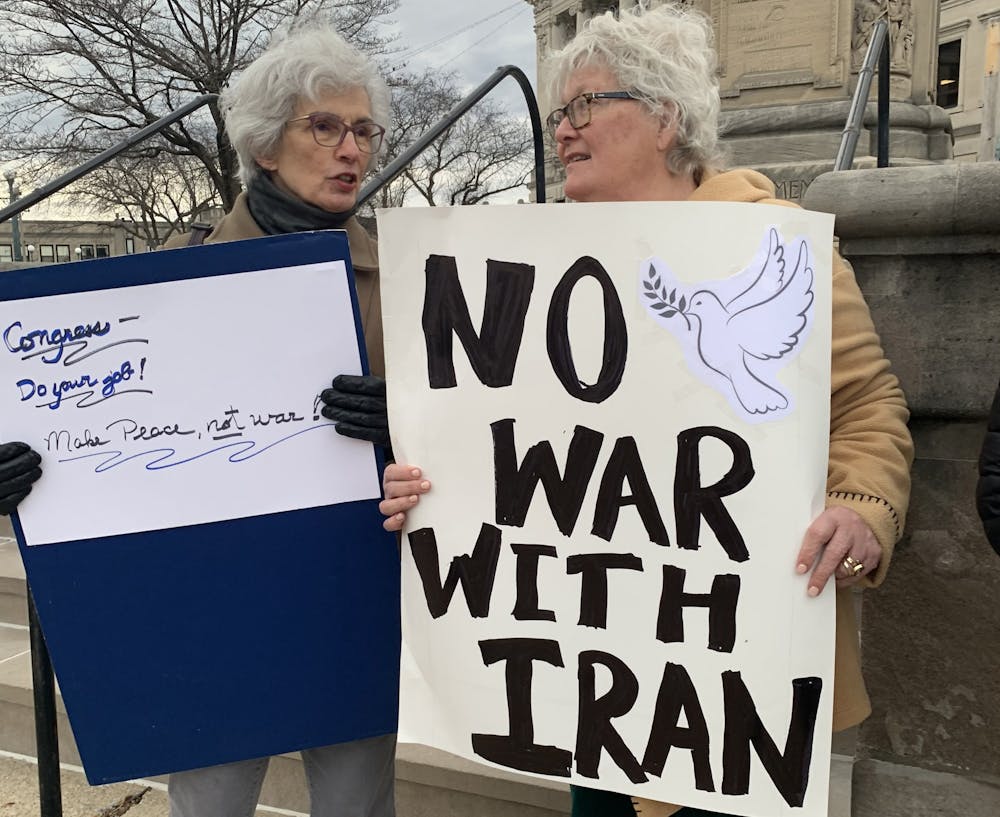In the aftermath of the U.S. killing of Iranian general Qasem Soleimani, Bloomington residents have publicly voiced their concerns.
A small group of residents held signs Thursday evening outside the Monroe County Courthouse to protest the conflict.
“No war, try wisdom,” one sign read.
The protest was part of the local arm of a large movement sponsored by public policy advocacy group MoveOn. MoveOn called for anti-war protests on Jan. 9 against the recent escalations in Iraq against Iranian militants. Across the nation, there was over 370 cities participating, according to their website.
“If we have any chance of living in peace diplomacy is the answer, not escalation,” said Lynne Shifress, who organized the Bloomington protests with MoveOn.
Another resident spoke out at Wednesday's Bloomington City Council meeting.
During the public comment period, David Keppel, a representative of the Bloomington Peace Action Coalition, called upon the council to pass a new resolution, one that would support the prohibition of nuclear weapons.
The resolution would show a stance against war with Iran, Keppel said.
The reactions come after President Donald Trump ordered an airstrike which killed Major General Qasem Soleimani and Abu Mahdi al-Muhandis on Jan. 3 outside a Baghdad airport. Soleimani, 62, was the leader of the Islamic Revolutionary Guard Corps’ Quds Force. Al-Muhandis, 65, was the deputy head of the Popular Mobilization Force, an Iraqi government-sanctioned paramilitary group.
IU Professor of Practice Feisal Amin Rasoul al-Istrabadi, founding director of the Center for the Study of the Middle East, was recently interviewed by CNN. He told the outlet the killing could destabilize Iran.
"This is a huge deal throughout the Middle East," al-Istrabadi told CNN. "The fact that it was done over the territory of Iraq means that Iraq will become what I feared it would become from the beginning: the battleground between Iran and the United States."
The airstrike on Soleimani was not approved by Congress before it launched, according to CNN.
In an interview with the Indiana Daily Student, al-Istrabadi said Trump should have consulted with Congress beforehand if he had knowledge of an upcoming attack.
“He is stronger when he makes decisions with the support of Congress and weaker without their support,” al-Istrabadi said.
The House of Representatives introduced a new motion on Thursday that would require President Trump consult with Congress before any future strike or military action, the motion passed in a majority 224-194, according to a World & U.S. News report.
Trump’s airstrike against Soleimani occurred on Iraqi soil and killed and wounded Iraqi citizens, and because of this, it is possible that Trump violated international law, al-Istrabadi said.
“We have an election coming up this year,” said al-Istrabadi. “Who knows if the Iranian government will use their international supporters and allies to take indirect action against the U.S. in the days, weeks or months leading up to it.”




